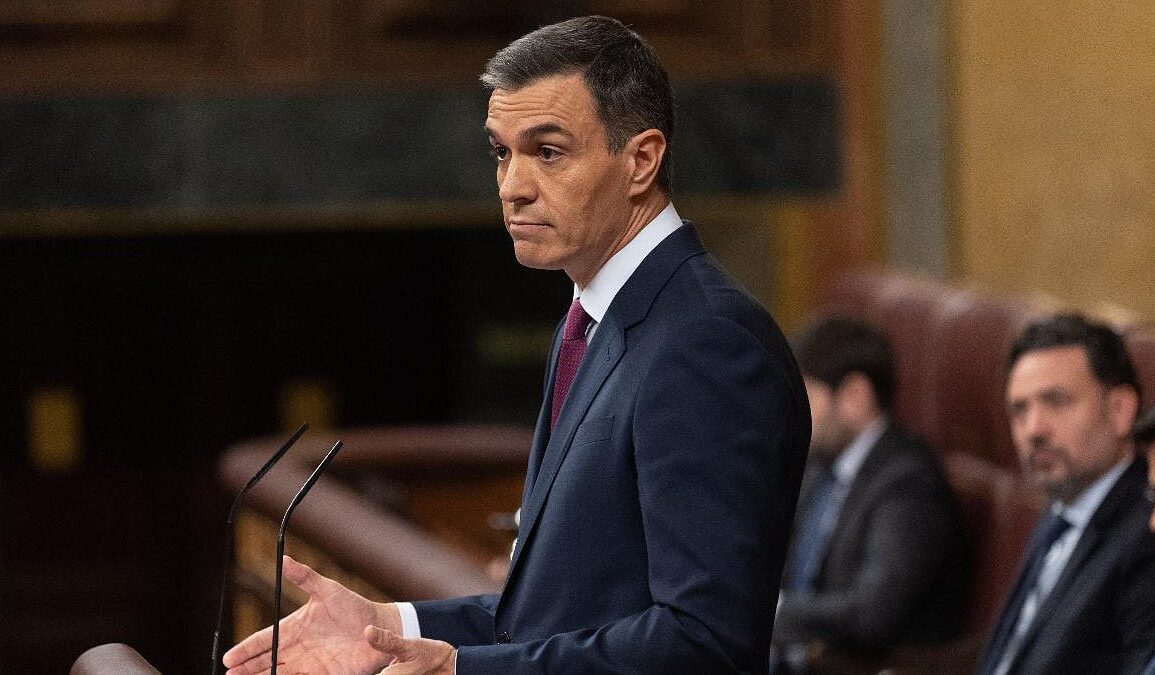Pedro Sánchez did it again. Taking into account the scenario prior to July 23, against all odds, he has once again been sworn in as President of the Government by a large absolute majority in Congress. Of course, after the appointment with the polls was held, the general secretary of the PSOE was the one who had the most options in the race for Moncloa as the PP did not obtain a sufficient majority to join Vox.
The socialist leader once again has the confidence of the Lower House. He does so with 12 more supports than in 2020, when he was inaugurated by a simple majority. On this occasion, in addition to the votes of the PSOE, Sánchez has managed to unite forces with different ideological sensitivities, but united by their plurinational character. The deputies of the PSOE, Sumar, ERC, Junts, EH Bildu, PNV, BNG and Canary Coalition have added 179 votes in favor compared to 171 votes against the PP, Vox and UPN.
The investiture session this Wednesday and Thursday has been marked by the amnesty for those prosecuted for the Catalan process, the measure that has also capitalized on the negotiations and has allowed the favorable vote of Junts, whose support allows Carles Puigdemont’s men to move to the path of governance, the path that ERC undertook four years ago. The need for the votes of the pro-independence parties has forced the PSOE to back down and accept the grace measure, which materialized in a bill finally registered alone by the socialists, but which has the support of all the parties that have supported Sánchez, with the exception of the Canarian Coalition (178 votes in total).nn
In his investiture speech this Wednesday, Sánchez explained that criminal oblivion is “perfectly legal and in accordance with the Constitution.” When the grace measure was processed in Parliament, the socialist general secretary recalled that “it will be approved under light and stenographers.” In this sense, he explained that ” it will not be an attack on the Constitution of ’78, but quite the opposite, another example of its strength and validity.”
However, the leader of the PSOE embraced the amnesty for the first time in Congress, after he did so in the Federal Committee at the end of October, and justified it “in the name of Spain, in the interest of Spain and in defense of “concord between Spaniards”. In addition to highlighting its usefulness to “solve the political conflict” in Catalonia, the law stands as a condition of governability to “prevent Spain from going backward, to ensure that our country continues to advance and also be an inspiration for many other European societies.” who see how the reactionary wave advances.”0 seconds of 1 minute, 18 seconds Volume 53% Pedro Sánchez guaranteed Junts that he will fulfill his commitment during the legislature.
Harassment of socialist deputies
Both the negotiations and the investiture debate have been involved in an atmosphere of tension, with small concentrations on the outskirts of an armored Congress, and the continuation of the protests at the PSOE headquarters, on Ferraz Street in Madrid. In the midst of this tension, stirred up by the extreme right, socialist leaders have suffered attacks and harassment. This harassment also occurred on the second day of the investiture meeting, when deputies Herminio Sancho, María Luisa García Gurruchaga, Daniel Senderos and Vicent Sarrià were harassed and insulted before their arrival at the Lower House.
You may be interested in: The attorney general justifies his impartiality regarding the amnesty law and lawfare: “He demands to know the final rule”
“The deputies have notified the Police, who have escorted them to Congress. All this between shouts, insults, threats and throwing eggs, one of which hit the head of Deputy Sancho. The aggressors have been identified by the Police and the PSOE will file the corresponding complaint,” socialist sources have narrated.
Me quiero dirigir a todos los grupos que hoy me darán su apoyo para renovar como presidente y formar un nuevo Gobierno de coalición.
— Pedro Sánchez (@sanchezcastejon) November 16, 2023
A los 179 diputados y diputadas que han comprometido su voto y que representan a más de 12,6 millones de ciudadanos que el pasado 23 de julio… pic.twitter.com/pzjHRB51QK
The socialist parliamentary spokesperson, Patxi López, addressed them in his speech, and the President of the Government in his speech to close the debate. And, over the last few days, socialists from different constituencies have been intimidated into voting against Sánchez’s investiture. The leader of the PSOE has thanked all of them and the socialist militants for their “trust.” “A negotiation that would recover political normality and allow the continuation of a progressive government needed discretion, and that discretion has been used” by the right to “spread outright falsehoods,” Sánchez said.
Despite everything, almost four months after the elections, Pedro Sánchez has been proclaimed President of the Government, giving continuity to the coalition Executive formed by PSOE and Sumar. Unlike the last legislature, Parliament is less fragmented, but the socialists are aware that it is now “more complex”, since they will need all the votes in all the votes to carry out their proposals. As several spokespersons have recalled throughout the investiture debate: now more than ever, it is the time for politics.





